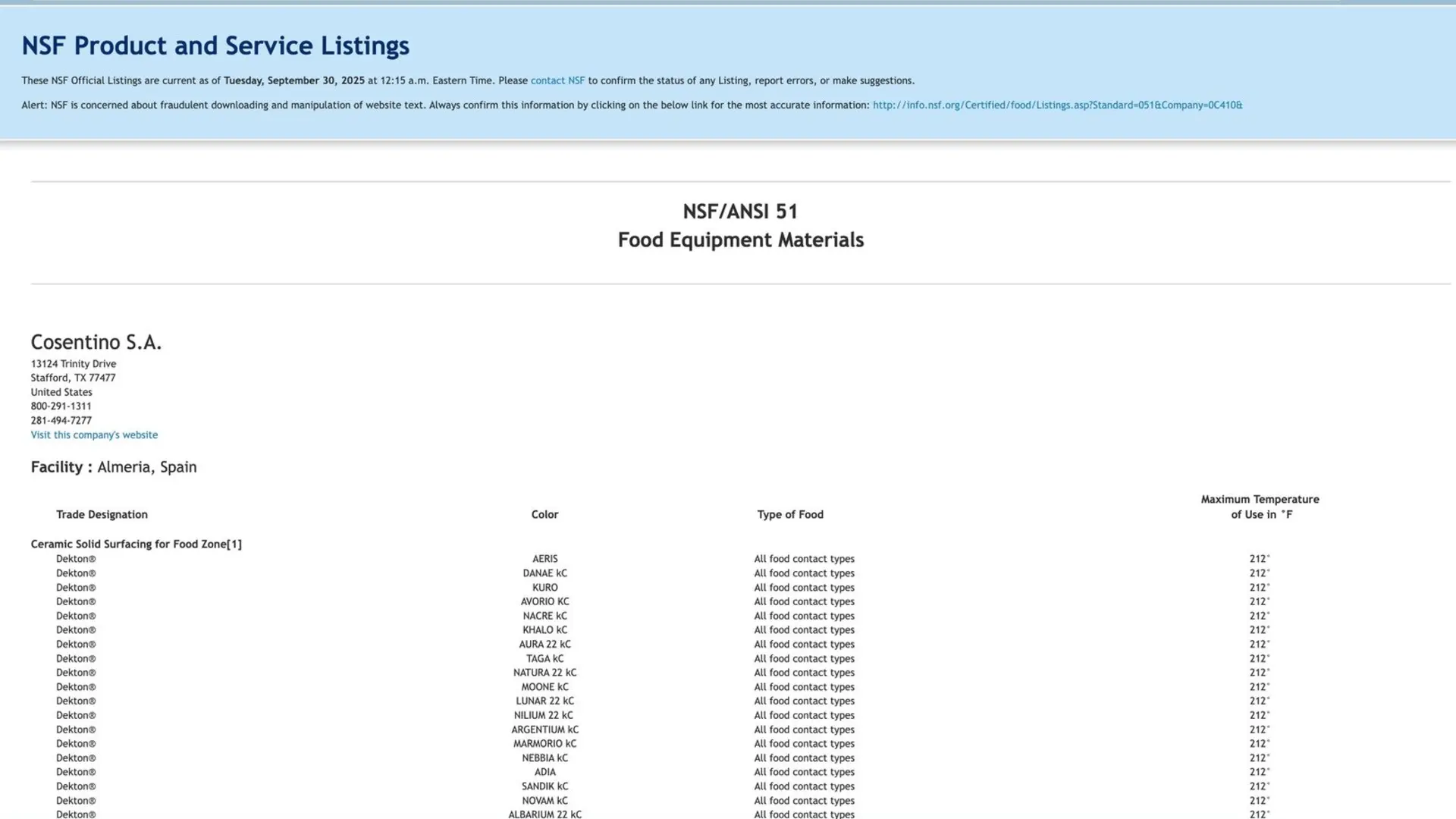Picture this: It's Sunday morning. Sunlight streams through your kitchen window as you dust flour across your pristine quartz countertop. The sourdough starter you've been nurturing for weeks is ready. As you turn out that perfect ball of dough directly onto the cool surface, kneading it with practiced hands, there's something deeply satisfying about the process.
But here's a question that might stop you mid-knead: Is your gorgeous countertop as food-safe as you think it is?
If you're someone who takes pride in cooking from scratch, makes pasta by hand, or teaches your kids to roll out cookie dough on the counter, this isn't just about aesthetics—it's about your family's health. And there's one certification that separates truly food-safe quartz from surfaces that just look the part: NSF-51.
The Hidden Truth About Your "Premium" Quartz Countertop
Here's what most countertop retailers won't tell you: Not all quartz is created equal—especially when it comes to food safety.
Yes, quartz countertops are beautiful. Yes, they're durable. And yes, they're marketed as the perfect surface for modern kitchens. But here's the catch: while your quartz might look flawless, what's lurking beneath that polished surface could be a different story entirely.
The Composition Conundrum
Quartz countertops are engineered stones, typically made from:
- Up to 93% ground natural quartz crystals
- At least 7% polymer resins, binders, and pigments
It's that second component—the resins and binders—where things get tricky. Lower-quality manufacturers might use resins that:
- Release volatile organic compounds (VOCs)
- Break down when exposed to acidic foods
- Create microscopic pores where bacteria can thrive
- Leach chemicals when in contact with hot items
Without proper certification, you're essentially taking the manufacturer's word that their product is safe for food contact. Would you trust your family's health to marketing claims alone? Understanding common myths about stone countertops can help you make a more informed decision.
Enter NSF International: The Guardian of Kitchen Safety
Before we dive into the specifics of NSF-51, let's talk about why NSF certification matters more than any marketing claim.
NSF International isn't just another certification body—they're the gold standard of public health and safety. For over 75 years, this independent, non-profit organization has been:
- Testing products used in restaurants worldwide
- Setting standards for medical devices
- Certifying water treatment systems
- Protecting consumers from unsafe products
When the world's top restaurants, hospitals, and food manufacturers need to ensure safety, they turn to NSF. Their testing isn't just rigorous—it's relentless. Products are subjected to surprise inspections, ongoing testing, and must maintain standards year after year to keep their certification.
NSF-51: The Food Safety Standard Your Kitchen Deserves
NSF/ANSI Standard 51 isn't just another number—it's specifically designed for "Food Equipment Materials." This is the exact same standard required for:
- Commercial kitchen prep surfaces in Michelin-starred restaurants
- Hospital food service areas
- School cafeteria preparation zones
- Professional bakery work surfaces
What NSF-51 Testing Actually Involves
For a quartz surface to earn NSF-51 certification, it must pass these critical tests:
- Chemical Migration Testing
- Surfaces are exposed to food simulants (acidic, fatty, and aqueous solutions)
- Scientists measure if any chemicals leach from the surface
- Even trace amounts of harmful substances mean automatic failure
- Microbiological Safety
- The surface is contaminated with bacteria, then cleaned
- Labs verify that bacteria cannot penetrate or survive on the surface
- Any porosity that could harbor pathogens results in rejection
- Cleanability Assessment
- Surfaces undergo repeated cleaning with various sanitizers
- Must maintain integrity without degradation
- No cracks, pits, or surface changes allowed
- Durability Under Stress
- Exposure to extreme temperatures
- Contact with acidic foods (lemon juice, vinegar, tomatoes)
- Resistance to cutting, impact, and wear
Real Kitchen, Real Risks: Why This Matters to You
Let's get practical about what happens in your kitchen when NSF-51 certification is missing:
Scenario 1: The Sunday Pasta Making Session
You're making fresh pasta with the kids. The eggs and flour are mixed directly on your non-certified quartz. Those microscopic pores in the uncertified resin? They're now hosting raw egg particles. Even after cleaning, bacteria can remain, multiplying in those tiny spaces. Next time you prep vegetables on that same spot, cross-contamination becomes a real risk.
Scenario 2: The Sourdough Enthusiast's Dilemma
Your beautiful sourdough starter has been fed and nurtured for months. As you knead it on an uncertified surface, chemicals from the low-quality resins slowly leach into your dough. You won't taste them, but over time, repeated exposure to these compounds can impact your health.
Scenario 3: The Holiday Cookie Tradition
Rolling out sugar cookies with the grandkids directly on the counter is a cherished tradition. But if your surface harbors bacteria from last night's chicken prep (hiding in microscopic surface imperfections), those festive cookies could come with an unwanted gift: foodborne illness.
The NSF-51 Advantage: What You're Really Getting
When you choose NSF-51 certified quartz, you're investing in:
1. True Non-Porosity
Not marketing-speak non-porous, but scientifically verified impermeability that prevents:
- Bacterial infiltration
- Stain absorption
- Odor retention
- Moisture damage
2. Chemical Stability
Your food touches only inert materials that won't:
- React with acidic ingredients
- Release harmful compounds when heated
- Degrade from regular cleaning products
- Interact with oils and fats
3. Professional-Grade Hygiene
The same safety standards used in:
- Commercial kitchens
- Healthcare facilities
- Food manufacturing plants
- Laboratory environments
4. Long-Term Peace of Mind
- No wondering if your surface is truly clean
- Confidence when cooking for immune-compromised family members
- Safety for baby food preparation
- Protection for fermenting and culturing projects
How to Verify Your Quartz is NSF-51 Certified (Don't Take Their Word for It)
Here's your action plan for ensuring you get genuinely certified quartz:
Step 1: Ask the Right Questions
When meeting with suppliers, ask specifically:
- "Is this exact product NSF-51 certified?"
- "Can you show me the certification documentation?"
- "What's the certification number?"
For a complete list of essential questions beyond certification, check our guide on crucial questions to ask your countertop supplier.
Red flags to watch for:
- Vague answers like "it meets food safety standards"
- Claims about being "NSF certified" without specifying NSF-51
- Inability to provide documentation
Step 2: Verify Independently
- Visit NSF's official database
- Search for the specific manufacturer:
- Silestone: Search for "Cosentino S.A."
- Caesarstone: Search for "Caesarstone Ltd" (Note: Caesarstone has four manufacturing countries)
- Check if your specific color is listed in the certification
- Screenshot or print the certification for your records
See Example

Step 3: Look for the Mark
Certified products often display:
- The NSF logo on samples
- Certification numbers on technical sheets
- NSF-51 specifically mentioned in product literature
Popular NSF-51 Certified Brands (Always Verify Current Status)
While certifications can change, here are brands that have historically maintained NSF-51 certification:
Important: Always verify current certification status, as product lines and formulations can change.
The Investment Perspective: Why NSF-51 Pays Off
Immediate Benefits
- Safe food preparation from day one
- No concerns about chemical exposure
- Confidence when cooking for others
- Peace of mind for family health
Long-Term Value
- Maintains property value (health-conscious buyers seek this certification)
- Reduces liability if you ever rent or sell
- Prevents costly health issues from contamination
- Eliminates need for additional prep surfaces or cutting boards
Looking for the perfect kitchen countertop that combines safety with style? NSF-51 certification should be at the top of your checklist.
Hidden Savings
- Fewer foodborne illnesses mean fewer medical bills
- No need for excessive sanitizing products
- Longer-lasting surface (quality materials age better)
- Reduced food waste from contamination concerns
Making the Right Choice: Your Family's Health is Non-Negotiable
Your kitchen countertop isn't just a surface—it's where memories are made, traditions are passed down, and nourishment begins. Every meal prep, every batch of cookies, every homemade pizza starts here.
When choosing a new kitchen countertop, and you choose NSF-51 certified quartz, you're not just selecting a countertop. You're making a statement about your values:
- Health comes first
- Quality matters
- Safety is non-negotiable
- Your family deserves the best
Take Action Today
Before your next kitchen renovation or countertop upgrade:
- Save this article as a reference for your shopping journey
- Share it with family members involved in the decision
- Bookmark the NSF certification database
- Ask every supplier about NSF-51 certification
- Don't compromise on this critical safety standard
Remember: You'll live with your countertop choice for decades. Your family will prepare thousands of meals on this surface. Make sure it's a choice that prioritizes their health and safety.
The question isn't whether you can afford NSF-51 certified quartz. It's whether you can afford not to have it.
Quick Reference Guide: NSF-51 at a Glance
What It Is: Food equipment materials safety standard
What It Tests:
- Chemical safety
- Microbiological resistance
- Cleanability
- Durability
Why It Matters:
- Prevents contamination
- Ensures chemical safety
- Provides professional-grade hygiene
- Protects your family's health
How to Verify:
- Check NSF database
- Request documentation
- Look for specific NSF-51 marking
Remember: Not all NSF certifications are equal. Only NSF-51 specifically addresses food contact safety.

